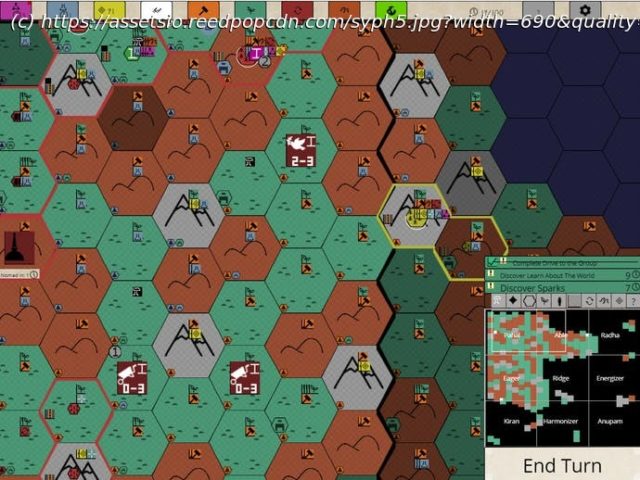The 4Xperts behind Civilization, Syphilisation and Victoria 3 discuss eXperimental 4X design.
4X games may sound incredibly reductive on the surface. After all, this is the only genre of game whose name is also a decree about how you should play — eXplore, eXpand, eXploit, eXterminate. But as any fan will tell you, 4X games are actually bustling sandboxes that can be played in all kinds of ways. For some players, that could mean eschewing military action or research or trying to make do with a single settlement. For others, it could mean trying to rewrite the historical events depicted — whether out of mischief, or in an effort to challenge narratives about the past that loom large in present-day politics.
Some 4X games lean into this spirit of eXperimentation. Take Syphilisation from Indian developer Nikhil Murthy, a «post-colonial 4X» and intricate parody of Civilization, centring on colonial India during the time of the British Raj. The game includes familiar 4X concepts and systems, but attempts to reframe «human struggle as a common striving for a better world rather than a competition between ourselves», though whether this ideal comes to fruition is up to the player. Rather than a government or ruler, the game casts you as one member of a group of research students, who put together their own interpretations of figures like Gandhi and Churchill while moving units and building cities.
I’m fascinated by Syphilisation, and got chatting with Nikhil on Twitter earlier this year. In one of those magical opportunities, it turns out he’s friends with Ryan Sumo, a prominent member of the Philippine gamedev scene and developer of cute-but-cutthroat election sim Political Animals, who is nowadays a business owner for Europa Universalis IV and Victoria 3 at grand strategy household Paradox Interactive. Ryan, it transpires, is friends with Firaxis veteran Jon Shafer, designer of Civilization IV: Warlords and Beyond The Sword, and lead designer of Civilization V. We all got together one very nerdy Friday afternoon to discuss the idea of a «postcolonial 4X», and how the genre’s portrayals of history and empire hit very differently, depending on where in the world you hail from. The below is a transcript of that conversation, edited for length and clarity.
Edwin: Perhaps we could start by talking about the inspiration and concept for Syphilisation, Nikhil, and how it’s evolved over time?
Nikhil Murthy: So I started this game because I was reading Ulysses by James Joyce, and there’s a moment in an Irish pub, where they’re discussing the British Empire, and he had the pun «syphilisation» for British civilization. And at the time, I was also kind of thinking about parody in games, and it just clicked. With other mediums, we have a rich history of parody, we take the structures we find and we subvert them to make other things. Gulliver’s travel is a subversion of adventure stories, right? And parody doesn’t have to just be humorous. So I was thinking like, what if I make a game that criticises another game and its genre through the mechanics, rather than writing an essay saying these are the flaws, or whatever. And I was thinking about that as I read this pun, and it just clicked. Yes, I can make a post-colonial 4X game — of course, 4X games have a lot of colonial ideology just kind of baked in.
So we’ll start with the two major pillars of 4X games that I think really hold a lot of ideology. The first is the idea of one winner, that you’ll end your 4X game and one nation has emerged pre-eminent over all the others, right? Either they dominated the world, or went to space, or whatever. The second is growth for the sake of growth, which is really baked into 4X games. And in the current moment, that really feels like it’s running up against reality, because we’re seeing climate catastrophe. We’re seeing the limits of growth for the sake of growth, in the world around us. It’s just we don’t see it in the games that act as translations of the world. So those are two really foundational points where a little pushback can be interesting, right? It just expands the space of the genre.
Ryan Sumo: The idea in 4X games of growth for the sake of growth — I hesitate to say it’s ‘natural’, but it’s so appealing, I guess, in a way that’s difficult to replicate. How do you subvert or replace that?
Nikhil: I think from a game design perspective, the way to start is that, yes, people want to grow in 4X games. But that doesn’t mean we have to just give it to them, right? In the same way that people want to win every war they get into, but if we just let them win wars where they’re 1-to-20, the war system is no fun. Because there’s no challenge, and it feels so disconnected. There’s no push and pull, but not just that — a lot of what we’re doing when we’re playing is inhabiting the space, and it feels like the space is purely fantastical if you’re just winning every war you walk into.
And when we build growth mechanics in 4X games and grand strategy games, it’s a lot of ‘you pay the cost, you get the benefit’, that’s the push and pull. There’s a lot of space there for more of a back and forth. To put specifics on it, in my game there’s a pollution system. And that’s one you can interact with in a number of ways. So given that my game is [presented as] a research group report, I have pollution be a metaphor for people getting fed up with everybody else in the group. So there’s a lot of back and forth that you can do as you get closer to others in the group, you get healthier about your own work ethics, and you’re polluting less. I feel that there is a lot of space there for complicating it, rather than just saying ‘you build a building, your production goes up’, you know?
Jon Shafer: Is the player’s goal different from the traditional 4X, where you have one winner?
Nikhil: You’re doing a group report, and in group reports you have a goal and supposedly, it’s cooperative, but when you do a group report there’s some amount of disagreement, there’s some amount of conflict. But the other thing I feel is that if you take a game like Civilization, with the space victories, where you put a person on Alpha Centauri or whatever — that doesn’t have to be competitive. You know, that can be a collaborative endeavour. Culture can be collaborative, for that matter — there’s no reason to frame all these things as having one winner.
That’s what I’m doing — in my game there’s one major goal of doing a good group report, getting as many points as you can. But a lot of the game is also just being friends with the other people. You know, those are explicit goals, learn about the other people in the group, become friends with them. It positions you as one of four students who really haven’t interacted that much. This, to me, is «natural». If you’re doing a group report with other people, that’s a way to get to know them.
But I feel like with a game like Civilization, in particular, it’s got a history that is in part inflected by boardgames, and it’s natural, if you’re going along the trajectory, to think of it as winner-takes-all. It’s also natural to think about the space race as the US versus Soviet Union. One must win, right? But if the idea is to get a person to Alpha Centauri, I don’t want my country sabotaging other countries that are trying to get there. That’s not what I want as an individual. I feel like there’s a lot of space in games to just say, we don’t have to do things the way we’ve been doing them.
Jon: One thing I’ve really noticed, particularly with Civilization, but also Paradox games and really, strategy games generally, especially more single player-focused ones, is that a huge part of the audience that plays these games, they’re looking more for a story. They’re looking for an interesting way to interact with the world, to kind of define what that world will become, rather than it being purely competitive.
I think something you talked about Edwin was like, enjoying that first X-and-a-half, the exploration part and the initial expansion part, before you’re really in competition. And that’s something that I’ve heard over and over again, from players — this is the fun part, this is what people are into. And yeah, you know, Nikhil, you talked about how it has this background in board games, which tend to be quite competitive. So yeah, there’s this friction there between those two different things that the game is doing.
I think anytime you have a game or a game series that’s as successful as Civilization, you’re always going to have multiple audiences that are looking for different things. But something that always really stood out to me was just how interested people were in the story side of things. And this is something I think we didn’t really think about much, as designers early on, but it became more obvious with the internet and with forums, that this is something that people really love. So I think you’re right, there is definitely a lot of space there to continue to explore.
Nikhil — what would you say has most influenced Syphilisation besides Civ? Where have you pulled ideas from?
Nikhil: There’s a book by McKenzie Wark called Gamer Theory, where she talks about a number of different games, and one of the things I got from there, one of the things she alludes to, is that a true postcolonial 4X game would not have the same conception of land that current 4X games have, right — those very map-heavy projections of power. I think if you were to truly make a post-colonial game, it would have a much more fluid conception of land. But what I felt is that with this game, I don’t want to alienate players right from the get-go. Because it’s already probably too much for a lot of players. I wanted to keep close to the base of Civilization wherever possible, to make the parody function, otherwise it just becomes noise, you know? But yeah, I stole a lot from a lot of places. I stole from Old World, I stole from Humankind.
Jon: What do you think about the tension between trying to explore new space and speak to new ideas versus fun? Because something I’m often asked about Civilization is whether Civilization is an educational game. And the answer is that it’s not, it’s a game and fun has always been the primary goal. And the fact that it ties in with history is important.






